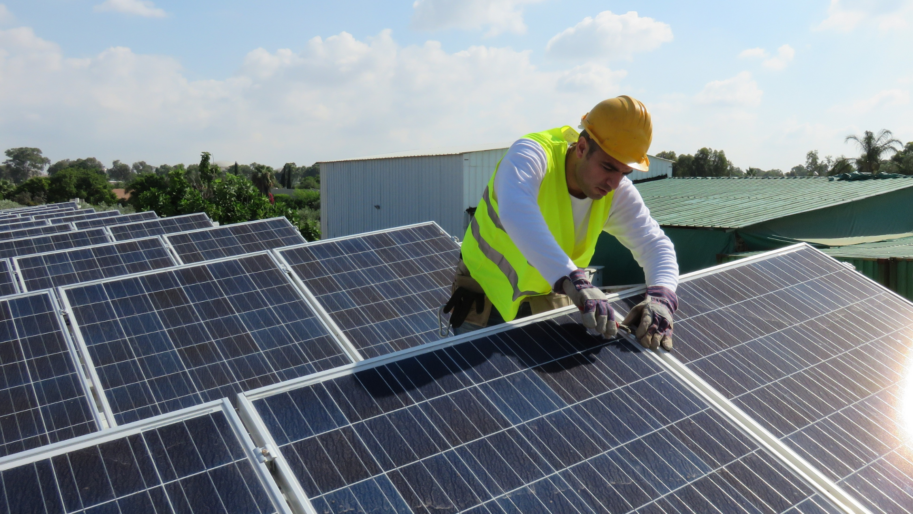Picture this: a trusted space in your neighborhood with a community garden, access to childcare, air conditioning, and power that is not interrupted when a disaster strikes. As disasters become more frequent and severe due to climate change, neighborhoods need new tools to build their resilience, especially low-income and disadvantaged neighborhoods most impacted by climate change and least resourced to deal with it. The State of California uses a tool known as the CalEnviro Screen to help identify communities disproportionately burdened by multiple sources of pollution. These communities may be located in the shadow of oil refineries, along freeway corridors, or near other polluting industrial facilities. Residents in these areas are more likely to have asthma, heart conditions, and other health risks related to exposure to pollution. Building community resilience means providing these communities with funding to plan, develop, and implement projects — from identifying community needs, resources, and potential sites to installing solar plus battery storage at resilience hubs that can be used to keep the lights on during a disaster.
As a Community Energy Resilience Project Manager with The Climate Center, one of my primary objectives is to identify state funding opportunities to promote and advance resilience in low-income and disadvantaged communities. I also work very closely with community-based organizations to help them navigate the often complex requirements for getting state funding for a project.
Nationwide, more than $50 billion of funding for climate resilience and adaptation has become available through the Bipartisan Infrastructure Investment and Jobs Act and the Inflation Reduction Act. This is a record-setting amount of federal funding that can help support enhanced resilience for these communities.
At the state level, California’s $3.7 billion Climate Resilience Package, invests in clean energy and climate initiatives, including funding for energy resilience in low-income and disadvantaged communities.
Communities can take advantage of upcoming state and federal funding opportunities so that we can all move faster toward a more clean, affordable, and resilient future.
See a list of federal and state funding opportunities for community-based organizations, local governments, and tribal entities below.
For questions or more information, contact Pamela Martinez at pamela@theclimatecenter.org.
| Agency | Program | Amount range | Open date | Deadline | Eligible entities | Description |
| Bay Area Council Foundation | California Resilience Challenge | Up to $200,000 | August 1, 2023 | September 29, 2023 | • California-based non-governmental organizations (NGOs) whose principal mission is serving or advocating for under- resourced communities • Local California public entities applying for projects targeted at benefiting under-resourced communities (must partner with a community based organization) • California Native American Tribes | Resiliency planning projects aimed at improving local resilience to climate impacts, including drought, flooding (including sea level rise), extreme heat and increasing frequency of hot days, and wildfire challenges, and water and air quality impacts of the foregoing. |
| California Energy Commission | Tribal Research Grant Program | From $20,000 – $400,000 Total available in account: $3,625,000 | September 1, 2023 | November 17, 2023 | • California Native American tribes, California tribal organizations, and tribal–serving non-governmental organizations (NGOs). • California Native American tribes includes federally and non-federally recognized tribes on the Native American Heritage Commission list. • It is recommended, but not required, that the primary eligible grant applicants are California Native American tribes | Tribal Research Grant Program is available to support tribally led projects focused on climate research, Indigenous Knowledge(s), and similar projects deemed a priority by California Tribes. |
| California Public Utilities Commission | Public Participation Grant Account | Up to $15,000 (per organization) Total available in account: $3,100,000 | September 8, 2023 | Ongoing until funds are exhausted | • Tax-exempt organizations under Section 501(c)(3) of the Internal Revenue Code • Federally or non-federally recognized California Native American Tribes • Tribal entities, including organizations incorporated under Tribal law and wholly owned by the Tribe | Reimbursement for participation in CPUC activities such as working groups, panels, or focus groups. |
| California Public Utilities Commission | Equity, Engagement, and Education Grant Account | Up to $200,000 Total available in account: $9,750,000 | September 8, 2023 | October 31, 2023 | • Tax-exempt organizations under Section 501(c)(3) of the Internal Revenue Code • Federally or non-federally recognized California Native American Tribes • Tribal entities, including organizations incorporated under Tribal law and wholly owned by the Tribe | Funding to build capacity to educate the community on and engage in CPUC decision-making processes |
| California Public Utilities Commission | Clean Energy Access Grant | Up to $500,000 Total available in account: $15,650,000 | Late 2023/ Early 2024 | TBD | • Tax-exempt organizations under Section 501(c)(3) of the Internal Revenue Code • Federally or non-federally recognized California Native American Tribes • Tribal entities, including organizations incorporated under Tribal law and wholly owned by the Tribe | Funding for projects addressing access to or education on CPUC clean energy programs including • MIP • SGIP • TECH |
| Environmental Protection Agency | Community Change Grants | $2 billion | Autumn 2023 | TBD | • A partnership between at least two community-based non-profit organizations • A partnership between a CBO and one or any combination of the following: • A Federally-Recognized Tribe • A local government • An institution of higher education | Projects that reduce pollution, increase community climate resilience, and build community capacity to respond to environmental and climate justice challenges |


